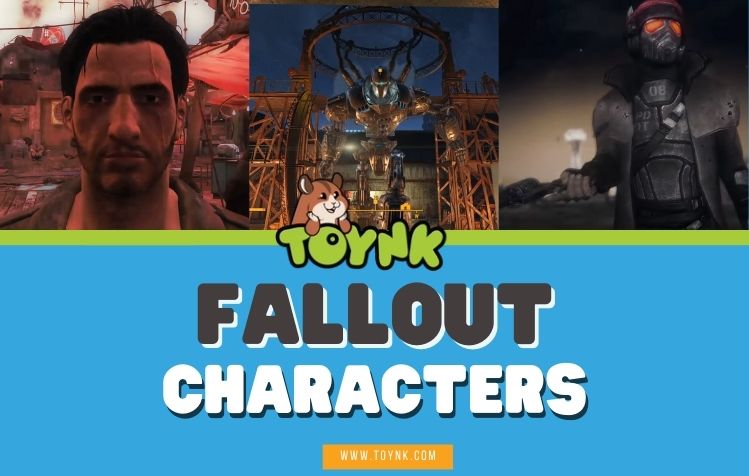The post-apocalyptic video game franchise Fallout faced bans and censorship across multiple countries due to mature content concerns. From drug use to violent imagery, we're breaking down why Fallout was banned and why this iconic series sparked global controversy.
4 Reasons Why Fallout Was Banned
1. Drug Use & Addiction

One of the biggest reasons the post-apocalyptic action video game was banned in many countries was its depiction of heavy drug use and addiction.
The player can take various in-game drugs known as “chems,” which would grant both positive and negative effects. These include increased strength and agility alongside lowered intelligence and addiction.
Moreover, the character was also given access to “morphine,” which, like its real-world counterpart, allowed them to ignore pain.
Aside from these drugs, the game also showcased visual representations of syringes, tablets, pill bottles, a crack-type pipe, and blister packs, which seemed to be heavily steeped in realism (as opposed to other games that showed generic potions).
2. Extreme Violence & Gore
Fallout is no stranger to mature themes, so it was banned in many countries because it depicted extreme violence and gore.
It is even more bloody, gory, and violent, especially if you use the in-game slow-motion feature.
The game allows you to kill off enemies in numerous violent ways, including — yes — decapitating them.
Read: Top Fallout Merchandise
3. Sexual Content & Themes

This game does have some sexual themes, but we have to say it’s a bit downplayed (compared to, say, GTA).
There are certain characters in the game that you can flirt with and have a romantic relationship with, and you would eventually be able to sleep with them. However, no nudity is shown.
4. Culturally Insensitive Content & Religious Concerns
Specific content elements triggered region-specific bans based on historical sensitivities and religious considerations.
Japan required extensive modifications, including the removal of the "Power of the Atom" quest, where players could detonate a nuclear bomb in an inhabited settlement. The country also mandated renaming the "Fat Man" weapon (referencing the atomic bomb dropped on Nagasaki) to "Nuka Launcher."
India completely banned Fallout's release due to two-headed mutant cattle in-game called "Brahmin" — a name that references both a sacred Hindu caste and fundamental religious concepts. The ability to kill and consume creatures bearing this religiously significant name proved deeply offensive in a nation where cattle hold sacred status.
Fallout: The Frontier, a community mod, faced separate controversy for depicting pedophilic content. The developer was removed from the team and all associated material was eliminated, though this incident remained distinct from official game censorship.
Where Is Fallout Banned?
Australia

Australia banned Fallout due to its reference to the drug “morphine” in-game. The Australian government didn’t like how the game rewarded players who took/used the drug.
Bethesda, the video game publisher of Fallout, eventually renamed “morphine” to “Med-X” worldwide to avoid controversy. Fallout was eventually released in the country after this censorship.
Germany
Aside from all other censorship, the German release of Fallout had additional censorship of removing all blood and gore.
Read: Fallout New Vegas Merchandise & More
Japan
Fallout had a side quest named “Power of the Atom,” wherein after talking to Mr. Burke, it gives the character a chance to detonate the nuclear bomb. There is no Mr. Burke in the Japanese release, so detonating the nuclear bomb won’t be possible.
Furthermore, Fallout is famous for its brutal killings, but the Japanese release removed the option of decapitating humans.
“The Fat Man” nuclear catapult weapon was also renamed “Nuka Launcher.”
If you know your history, you know “The Fat Man” was a codename for the bomb the Americans dropped over Nagasaki at the height of World War II. [1]
Other censorships were also applied in the game’s Japan release.
Saudi Arabia

Fallout is banned in Saudi Arabia, but it is unclear why.
We can assume that the game was banned due to its intense language, blood, gore, violence, and the use of various fictional drugs.
India
India represents the most complete censorship case, with Microsoft India announcing it would not release Fallout 3 at all, citing "cultural sensitivities."
The primary issue centered on mutant cattle called "Brahmin" that players could kill, skin, and consume for resources. "Brahmin" references the highest caste in Hindu society and shares its name with Brahman, a central concept in Hindu philosophy representing ultimate reality.
The depiction of mutant cattle named "Brahmin" being routinely slaughtered proved incompatible with Hindu religious values in a nation where approximately 80 percent of the population practices Hinduism and several states legally prohibit cattle slaughter. The presence of this offensive content made release impossible.
Unlike other countries where modifications enabled eventual release, India's concerns required such fundamental changes to core game systems that complete market cancellation proved more viable than attempting accommodation.
The Evolution of Global Game Censorship
The Fallout censorship cases illustrate how cultural values, historical trauma, and regulatory frameworks vary dramatically across international markets.
Australia's introduction of R18+ video game ratings in 2013 reflected growing recognition that mature content deserved appropriate classification pathways rather than automatic prohibition. Germany's shift toward uncensored releases by 2015 demonstrated how digital distribution challenges and digital platforms made maintaining strict national content barriers increasingly impractical.
The permanent Med-X modification shows how single-market regulatory decisions can create lasting global franchise changes. Rather than maintain multiple versions, Bethesda standardized the fictional drug name across all releases, prioritizing consistency over regional accuracy.
These patterns reveal the complex balance publishers must strike between global standardization for efficiency and cultural sensitivity for market access across different countries.
FAQs
Is Fallout 3 banned?
Fallout 3 faced bans and censorship in multiple countries, including Australia (initially), Germany, Japan, Saudi Arabia, and India. Many regions eventually allowed modified versions after specific content changes addressed regulatory concerns, though some markets never received access to the game. In some cases, the game was temporarily blocked before publishers decided how to adapt it for present audiences while keeping its story intact.
Are all Fallout games banned?
No. Most countries allow Fallout games without censorship, including the United States, Canada, the United Kingdom, and most of Europe. Restrictions primarily affect specific regions with unique cultural sensitivities or strict content regulations. For example, markets concerned with younger children or public security may impose limits to protect local standards.
Why did Australia initially ban Fallout 3?
Australia's Classification Board refused classification due to real-world drug references (morphine) combined with gameplay rewards for substance use. The lack of an R18+ video game rating at the time meant content exceeding MA15+ standards faced automatic prohibition. This caused significant discussion among companies, regulators, and the gaming community, with many talking about the need for more balanced services to evaluate mature games fairly.
What changes did Bethesda make for international release?
The primary global modification renamed "morphine" to "Med-X," a change that became permanent across all future Fallout titles. Region-specific censorship addressed violence (Germany), atomic weapon references (Japan), and quest content (Japan).
Key Takeaways
Fallout's complex censorship history reflects the challenges of distributing mature content across diverse cultural contexts.
The franchise pushed boundaries with its unflinching depiction of post-apocalyptic society, including substance abuse, extreme violence, and morally ambiguous player choices. While these elements created compelling gameplay in Western markets, they triggered regulatory intervention in countries with different cultural values and historical sensitivities — particularly concerning content set in inhabited areas or involving nuclear themes that could appeal differently across cultures.
Australia's morphine controversy led to permanent franchise changes, demonstrating how regulatory decisions in one market can reshape global creative properties. Japan's atomic weapon sensitivities reflected lived historical trauma requiring sensitive modification, while India's complete cancellation illustrated that some cultural incompatibilities cannot be resolved through editing or advertising restrictions alone.
For fans of the series, we offer an extensive collection of officially licensed Fallout merchandise celebrating this groundbreaking franchise. Before purchasing, be sure to check each review to find the collectibles that best match your interests and appreciation for the series’ legacy. Explore our Fallout collection here.
Reference:
- https://www.history.navy.mil/content/history/museums/nmusn/explore/photography/wwii/wwii-pacific/bombardment-japan/bombs-atomic/fat-man-nagasaki.html



